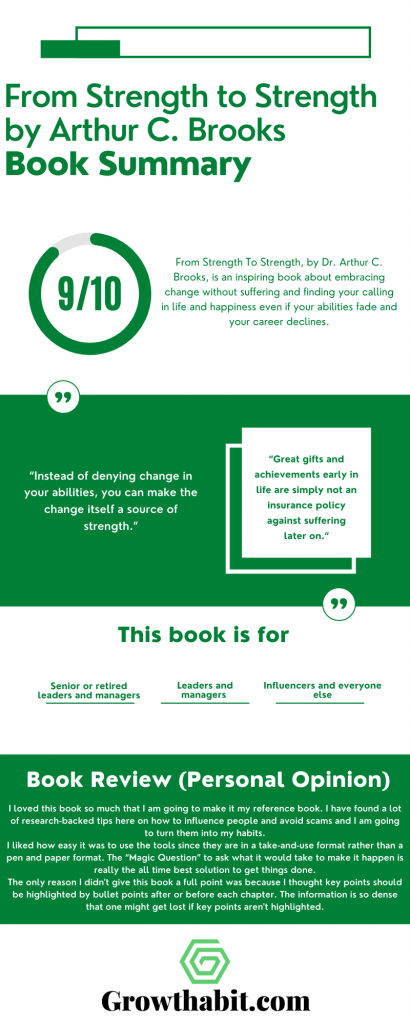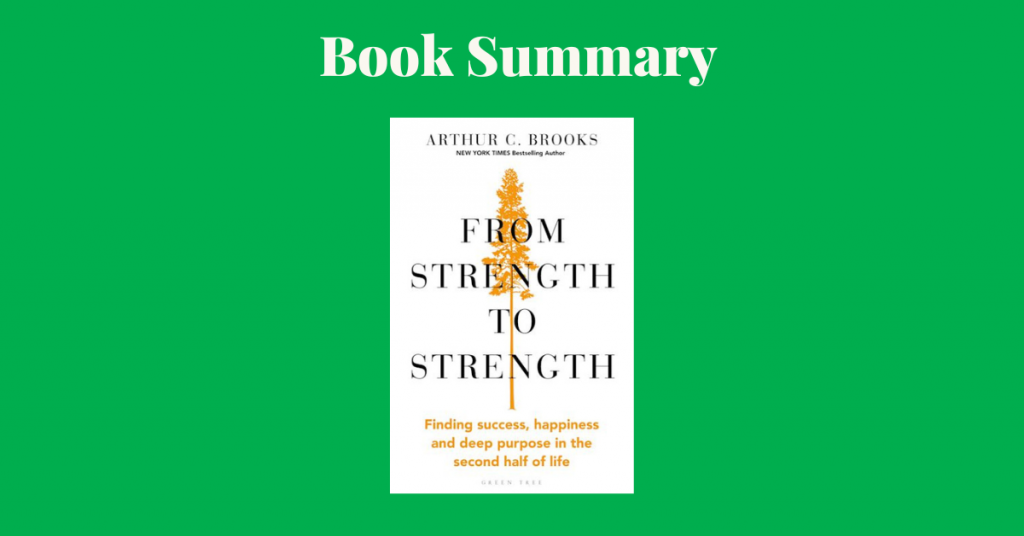From Strength To Strength, by Dr. Arthur C. Brooks, is an inspiring book about embracing change without suffering and finding your calling in life and happiness even if your abilities fade and your career declines.
Book Title: From strength to strength: finding success, happiness, and deep purpose in the second half of life
Authors: Arthur C. Brooks
Date of Reading: April 2022
Rating: 9/10
What Is Being Said In Detail:
In this book, the author explains how the end of your career is a perfect time to start a new career and step on the second curve of happiness and satisfaction.
As abilities diminish and careers end, it is natural to feel hard feelings, and this book acknowledges this and provides advice on how to cope with them.
But it also offers numerous examples of how inevitable changes in the lives of great people were new beginnings that did not necessarily involve suffering.
In this book, every word and recommendation are derived from science, philosophy, theology, and history in order to help you how to break free from old habits and reinvent yourself
There are nine chapters in this book, as well as an introduction and conclusion. Despite each chapter’s value on its own, it is far more powerful to read them one after another.
The Man on the Plane Who Changed My Life
Introduction describes the “striver’s curse” and how people gradually become aware of how their abilities start to fade.
Your Professional Decline Is Coming (Much) Sooner Than You Think
Chapter 1 discusses a decline in career and what is behind it as well as how to approach it positively so as to turn it into an opportunity rather than a failure.
The Second Curve
Chapter 2 describes a “second curve” in your life when you start a new vocation and lifestyle, which adds meaning to the second half of your life and makes you happier and more satisfied than ever before.
Kick Your Success Addiction
Chapter 3 describes how success is an addiction and what workaholism is. You’ll learn about losing your self-identity because of a compulsion to succeed, and how it destroys your relationships.
Start Chipping Away
Chapter 4 is about getting rid of stuff that doesn’t add value to your life and keeping the things that do in order to create a new life around them.
Ponder Your Death
Chapter 5 explores the idea of death and how it affects an individual’s perception and changes their priorities for the better.
Physical death is compared to professional death in this chapter to highlight that one can, and indeed, should, be reborn after professional death.
Cultivate Your Aspen Grove
Chapter 6 compares how trees build huge interconnected systems with their roots to how people are connected to one another in similar ways.
If one’s abilities decline, it makes way for another to grow in their ability to bring fruit to the world.
Start Your Vanaprastha
Chapter 7 explores how a lot of people use spirituality and religion as a way to cope with declining career prospects and how to approach spirituality and religion if it comes into play for the first time in a very long time.
Make Your Weakness Your Strength
Chapter 8 is about looking at every weakness as an opportunity to grow stronger, and it must be embraced with an open mind, since pain and suffering can boost your productivity and help you find your calling.
Cast into the Falling Tide
Chapter 9 describes how changes are a natural part of human existence and that there is nothing more permanent than change.
It can help you cope with the fear of change and embrace the opportunities that come with it.
Seven Words to Remember
Conclusion sums up the entire book by showing how one can overcome nature and instincts to transform their life and achieve new levels of happiness.
Most Important Keywords, Sentences, Quotes:
INTRODUCTION – The Man on the Plane Who Changed My Life
“I came to call this the “striver’s curse”: people who strive to be excellent at what they do often wind up finding their inevitable decline terrifying, their successes increasingly unsatisfying, and their relationships lacking.”
“Instead of denying change in your abilities, you can make the change itself a source of strength.”
CHAPTER ONE – Your Professional Decline Is Coming (Much) Sooner Than You Think
“[…] the more accomplished one is at the peak of one’s career, the more pronounced decline seems once it has set in.”
“It’s very hard to admit that it’s time. We’re expert at denial. We have been successful because we refuse to accept the overwhelming odds at making it in our profession, so early in our development denial is a positive.”
“We learn early on that practice makes perfect; there is plenty of research telling us that mastery comes from ten thousand hours of work, or some really high number like that.
In other words, life has a formula: the more you do something, the better at it you become.”
“Progress isn’t a straight line upward.”
“[…] older adults can enhance their cognitive effectiveness precisely by taking their own advice: turn off the phone and music and go someplace completely quiet to think and work.”
“[…] whether we are famous or not, almost nothing feels worse than becoming irrelevant, or even useless, to others who once held us in esteem.”
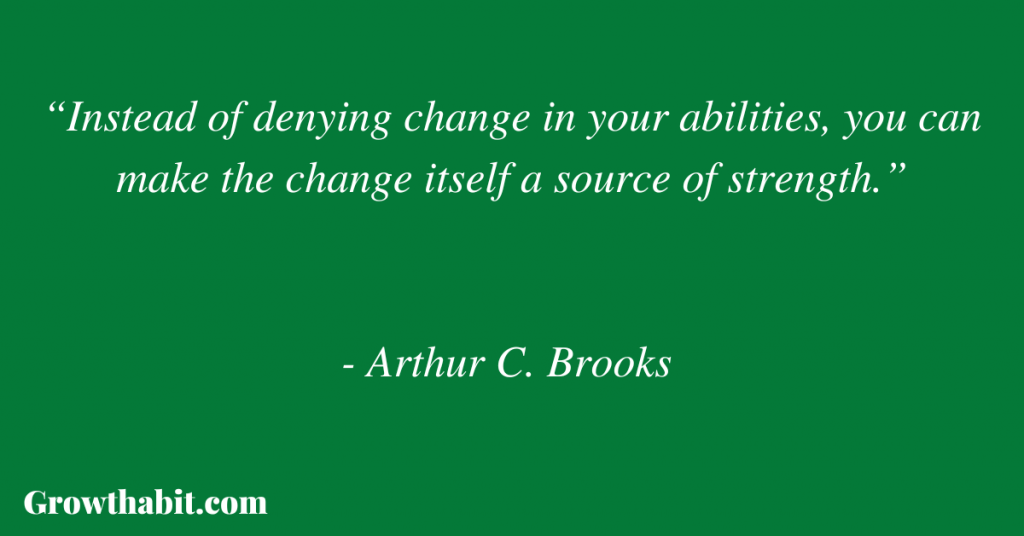
“[…] the “principle of psycho-professional gravitation”: the idea that the agony of decline is directly related to prestige previously achieved, and to one’s emotional attachment to that prestige.
If you have low expectations and never do much (or do a lot but maintain a Buddha-like level of nonattachment to your professional prestige), you probably won’t suffer much when you decline.
But if you attain excellence and are deeply invested in it, you can feel pretty irrelevant when you inevitably fall from those heights. And that is agony.”
“Great gifts and achievements early in life are simply not an insurance policy against suffering later on.”
“My Olympic self will ruin my marriage and will leave my kids feeling inadequate. Living life as if every day is an Olympics only makes those around me miserable.” – Olympic gold medal gymnast Dominique Dawes
“Humans simply aren’t wired to enjoy an achievement long past. […] we run and run, hoping that the next success, greater than the last, will bring the enduring satisfaction we crave”
“[…] it’s actually a triple whammy, because as we try to stay even, we wind up in patterns of addictive behavior such as workaholism, which puts strivers into unhealthy relationship patterns at the cost of deep connection to spouses, children, and friends.”
“No one feels sorry for a successful person. The suffering of a striver with a comfortable life invokes the image of the world’s smallest violin.”
CHAPTER TWO – The Second Curve
“Decline is unavoidable. Period.”
“[…] people maintain and grow their vocabulary—in their native languages and foreign languages—all the way to the end of life.”
“[…] with age, people are better at combining and utilizing complex ideas.”
“[…] fluid intelligence […] [is] defined as the ability to reason, think flexibly, and solve novel problems.”
“[…] crystallized intelligence […] is defined as the ability to use a stock of knowledge learned in the past.”
“Cattell himself described the two intelligences in this way: “[Fluid intelligence] is conceptualized as the decontextualized ability to solve abstract problems, while crystallized intelligence represents a person’s knowledge gained during life by acculturation and learning.”

Translation: When you are young, you have raw smarts; when you are old, you have wisdom.
When you are young, you can generate lots of facts; when you are old, you know what they mean and how to use them.”
“This is a big finding for you and me—huge, actually. It says that if your career relies solely on fluid intelligence, it’s true that you will peak and decline pretty early.
But if your career requires crystallized intelligence—or if you can repurpose your professional life to rely more on crystallized intelligence—your peak will come later but your decline will happen much, much later, if ever.”
“[…] there always exists the ability to redesign your career less on innovation and more on instruction as the years pass, thus playing to your strengths with age.”
“Cicero believed three things about older age.
First, that it should be dedicated to service, not goofing off.
Second, our greatest gift later in life is wisdom, in which learning and thought create a worldview that can enrich others.
Third, our natural ability at this point is counsel: mentoring, advising, and teaching others, in a way that does not amass worldly rewards of money, power, or prestige.”
“So, what do the young hotshots need? Old people on product teams, old people in marketing, and old people in the C-suite.
They need not just whizbang ideas but actual wisdom that only comes with years in the school of hard knocks.”
“So, why do people try, over and over again?
Two reasons: First, they are not aware that their first curve naturally bends down—they think something is wrong with them.
And second, they don’t know that another curve exists that will take them to a new kind of success. And even if they do suspect there’s another curve out there, it can be hard and scary to make the jump.
It requires the courage and fortitude to make changes in our lives and careers—to become more of a teacher, whatever that means in one’s specific field. Not everybody wants to do that. Many refuse.”
“We are all born with gifts. Some find them when they are young […]. Some find their calling later, […]. Others find them only after realizing they were going in the wrong direction for a while […]”
“No matter how you find your passion, early on, pursue it with a white-hot flame, dedicating it to the good of the world. But hold your success lightly—be ready to change as your abilities change.”
“[…] every change of circumstances is a chance to learn, grow, and create value.”
“[…] Get on your second curve. Jump from what rewards fluid intelligence to what rewards crystallized intelligence. Learn to use your wisdom.”
“[…] the three things you need to do starting right now to make the second curve better than the first: develop your relationships, start your spiritual journey, and embrace your weaknesses.”
CHAPTER THREE – Kick Your Success Addiction
“Maybe I would prefer to be special rather than happy.”
“Anyone can do the things it takes to be happy—go on vacation, spend time with friends and family . . . but not everyone can accomplish great things.”
“We too often do this to other people: reduce them to one or two enviable characteristics such as physical beauty, money, or power.”
“- If you were miserable, why did you keep doing it?
– I cared more about being high than being happy.”
“[…] people who choose being special over happy are addicts.”
“[…] people in high-pressure jobs tend to self-medicate with alcohol, including drinking at hazardous levels, which can turn off the sensation of anxiety like a switch—temporarily.”
“[…] Workaholism feeds fear and loneliness; fear and loneliness feed workaholism.”
“[…] Working hard and enjoying it doesn’t make you a workaholic.”
“[…] workaholics have many of the same patterns of behavior and estrangement with their spouses as alcoholics do. The addict feels misunderstood and under attack and engages in secretive behavior.”
“Workaholism keeps you chained to your job. But even more, it keeps you stuck in all your old work patterns, because you fear doing anything that separates you from the day in, day out of your most important relationship.
And that makes jumping to a new curve all but impossible.”
“What workaholics truly crave isn’t work per se; it is success.”
“Something is clearly wrong when the idea of being “normal” induces enough panic to make someone neglect the people they love in favor of the possible admiration of strangers.”
“Perhaps we are evolved for the success addiction.
It makes sense, if success enhances our genetic fitness, making us more attractive to others (that is, until we ruin our marriages). But to be constantly noticed, to achieve specialness, doesn’t come cheap.”
“As soon as a person becomes an Object of appetite for another, all motives of moral relationship cease to function, because as an Object of appetite for another a person becomes a thing and can be treated and used as such by every one.” – Immanuel Kant
“[…] objectification of people as workers ruins happiness.”
“[…] workplace objectification leads to burnout, job dissatisfaction, depression, and sexual harassment.”
“Self-objectification lowers self-worth and life satisfaction.”
“[…] self-objectification leads to a sense of invisibility and lack of autonomy and has a direct relationship with eating disorders and depression.”
“We love the image of ourselves as successful, not ourselves in true life.”
“[…] self-objectification is a problem of pride. […] Success, the fruit of excellence, becomes an addiction. All because of pride”
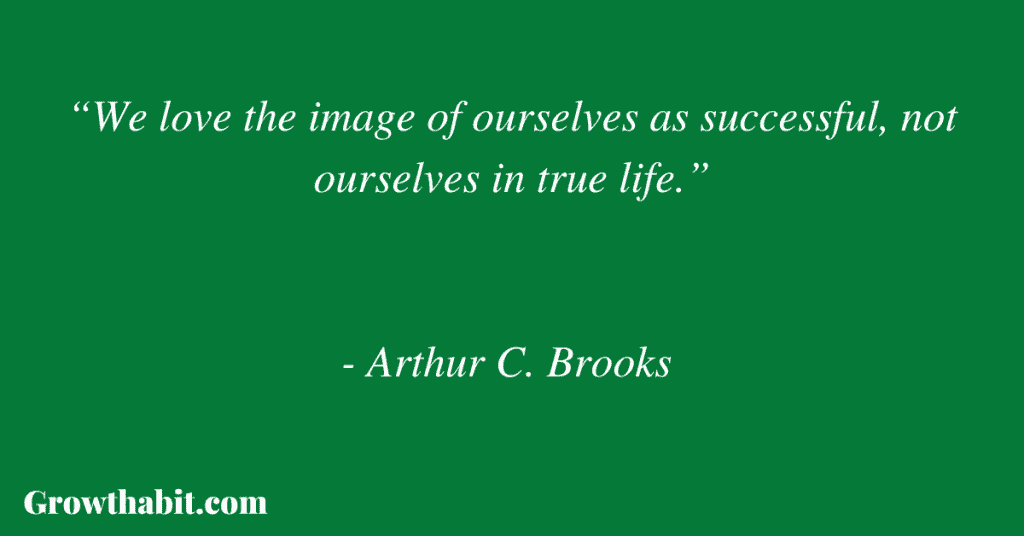
“[…] people who strongly fear failure don’t take much pleasure from their actual accomplishments and have high anxiety about not performing well at a crucial moment.”
“[…] the idea of falling behind creates a sense of panic, like facing the prospect of catastrophic failure.”
“[…] the symbols of your specialness have encrusted you like a ton of barnacles.
Not only are these things incapable of bringing you any real satisfaction; they’re making you too heavy to jump to your next curve. You need to chip a bunch of them away.”
CHAPTER FOUR – Start Chipping Away
“[…] acquisitiveness leads to materialism and vanity, which derails the search for happiness by obscuring one’s essential nature.”
“As we age, we shouldn’t accumulate more to represent ourselves but rather strip things away to find our true selves—and thus, to find our second curve.”
“To get off the first curve and onto the second, instead of adding more and more to our lives, we need to understand why this doesn’t work and then start taking things away.”
“[…] release from suffering comes not from renunciation of the things of the world, but from release from attachment to those things.”
“We know more or less how to meet our desire for satisfaction but are terrible at making it last. It’s almost as if our brains won’t let us enjoy anything for very long.”
“[…] many people who have gotten rich know how to measure their self-worth only in material terms, so they stay on the hedonic treadmill of earning and acquiring, year after year.
They hope that at some point, they will finally feel truly successful, happy, and thus ready to die. But it never works.”
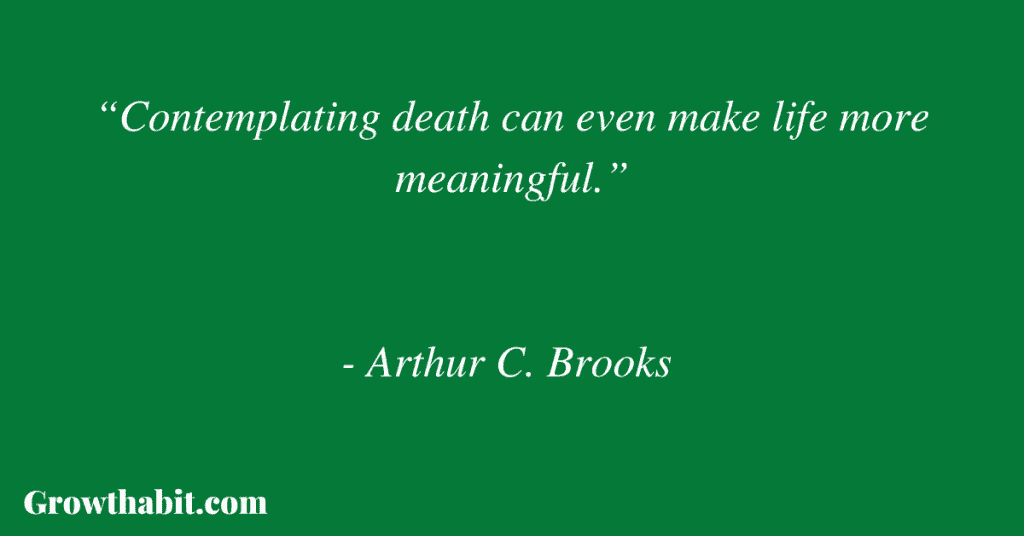
“[…] the unhappiest people were consistently those paying the most attention to how they performed relative to other subjects.
The small rush of pleasure we get from being envied by others one minute is swallowed up by the unhappiness from having less than someone else the next minute.
But the urge to have more than others tugs at us relentlessly.”
“It makes no sense in modern life to use our energies to have five cars, five bathrooms, or even five shirts, but we just… want them.”
“[…] people don’t realize their unhealthy attachments in life until they suffer a loss or illness that makes the important things come into focus.”
CHAPTER FIVE – Ponder Your Death
“If you love your work so much, you might as well enjoy it while you are doing it. If you spend time thinking about and working on your legacy, you are already done.”
“The worst thing about death is the fact that when a man is dead it is impossible any longer to undo the harm you have done him, or to do the good you haven’t done him.
They say: live in such a way as to be always ready to die. I would say: live in such a way that anyone can die without you having anything to regret.” – Leo Tolstoy
“Contemplating death can even make life more meaningful.”
“[…] scarcity makes everything dearer to us. Remembering that life won’t last forever makes us enjoy it all the more today.”
“We should not avoid the truth. We should stare right at it; contemplate it; consider it; meditate on it.”
“The true master, when his or her prestige is threatened by age or circumstance, can say, “Don’t you see that I am a person who could be utterly forgotten without batting an eye?”
CHAPTER SIX – Cultivate Your Aspen Grove
“[…] humans are naturally interconnected — biologically, emotionally, psychologically, intellectually, and spiritually. Creating an isolated self is dangerous and damaging because it is unnatural.”
“[…] the lone person—no matter how strong, accomplished, and successful—is a misunderstanding of ours […].
We may look solitary, but we form a vast root system of families, friends, communities, nations, and indeed the entire world.
The inevitable changes in my life—and yours—aren’t a tragedy to regret. They are just changes to one interconnected member of the human family—one shoot from the root system.
The secret to bearing my decline—no, enjoying it—is to be more conscious of the roots linking me to others.
If I am connected to others in love, my decrease will be more than offset by increases to others —which is to say, increases to other facets of my true self.”
“[…] the crystallized intelligence curve is predicated on interconnectedness. Without it, my wisdom has no outlet.”
“Happiness is love. Full stop. There are two pillars of happiness… One is love. The other is finding a way of coping with life that does not push love away.”
“[…] in terms of health outcomes, loneliness is comparable to smoking fifteen cigarettes per day and is worse than obesity. It is also strongly associated with cognitive decline and dementia.”
“[…] loneliest of all are those who are married but with an “absent spouse.””
“[…] the kind of people who don’t know how to manage social interactions outside of work get lonelier when they retire.”
“Wrapped up in their fear of falling behind, success-addicted workaholics—like all people controlled by their addictive behavior—leave little room in their lives for friends or family.”
““Loneliness reflects how you feel about your relationships.” So even though they may be in a family or a crowded workplace, workaholics feel all alone, except for their terrible, beloved work.”
“Studies also have shown that loneliness is linked to burnout among leaders.”
“The relationships that best mitigate loneliness—the aspens closest to us that we need to cultivate — are romantic partnerships and close friendships.”
“The important thing for health and well-being is relationship satisfaction.”
“You might accurately say that falling in love is the start-up cost for happiness—an exhilarating but stressful stage we have to endure to get to the relationships that actually fulfill us.
The secret to happiness isn’t falling in love; it’s staying in love, which depends on what psychologists call “companionate love” — love based less on passionate highs and lows and more on stable affection, mutual understanding, and commitment.”
“Best friends get enjoyment, satisfaction, and meaning from each other’s company. They bring out the best in each other; they gently tease each other; they have fun together.”
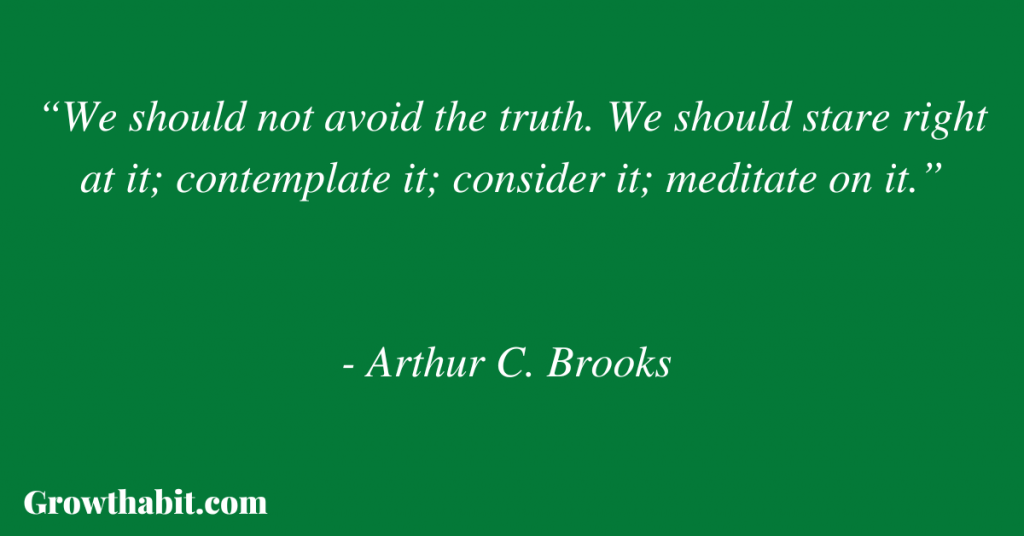
“American adults found that for men and women alike, “the happiness-maximizing number of sexual partners in the previous year is calculated to be 1.”
“Your romantic partnership is arguably your most important relationship. […] You can be single and happy if you have other close, fulfilling family links and friendships.”
“[…] contact with unrelated friends is more strongly correlated with well-being than contact with adult children.”
“[…] the number of real friends needs to be more than zero and more than just your spouse.”
“[…] men tend to develop friendships in the course of shared activities, and these crafts allow this while not requiring direct collaboration.”
“Success addicts are often the object of tremendous resentment from people who needed and deserved their love and attention but did not receive it for many years.”
“With relationships, actions speak louder than words, especially if your words have been fairly empty in the past.”
CHAPTER SEVEN – Start Your Vanaprastha
“Mountains of research show that religious and spiritual adults are generally happier and generally suffer less depression than those who have no faith.”
“[…] if you are in a transitional state in your life and find your interest in transcendental growing — even if you have marginalized this part of life in the past—you are right on schedule. Don’t resist.”
“[…] your spiritual development is that important. You must make the time by scheduling your meditation, prayer, reading, and practice. Every day.”
“Fulfillment cannot come when the present moment is little more than a struggle to bear in order to attain the future, because that future is destined to become nothing more than the struggle of a new present, and the glorious end state never arrives.
The focus must be on the walk that is life with its string of present moments.”
“[…] “gratitude walk” [is] the practice of focusing on the positive events in your life while walking, helping you to savor happiness by amplifying gratitude.”
“What so often holds people back […] is that it feels like a kind of weakness to lean on spirituality after a lifetime of holding up oneself.
And if there’s one thing strivers hate, it’s weakness. […] however, wanting spiritual depth is not a weakness, it is a new source of strength — strength needed to jump to the crystallized intelligence curve.”
CHAPTER EIGHT – Make Your Weakness Your Strength
“The secret to going from strength to strength is to recognize that your weakness — your loss, your decline — can be a gift to you and others.”
“Your decline, as painful as it is, should be experienced — and shared.”
“[…] sadness has persisted in the face of evolution because it brings cognitive benefits.
There is evidence that it makes us better at assessing reality in social situations, because we are less likely to flatter ourselves or gloss over negative truths.
Sadness can even make us more productive at work by enhancing focus and helping us learn from mistakes.”
“It is easy to imagine that attempts to eliminate pain and weakness from daily life could lead to a sort of emotional allergy — that when hard times come and someone feels grief or fear that is impossible to ignore, that person will not have the tools to face these feelings.”
“Weakness befalls us all, and in many ways. It has its discomforts to be sure and entails loss.
But it is also an opportunity — to connect more deeply with others; to see the sacredness in suffering; even to find new areas of growth and success. Stop hiding it, and don’t resist it.”
“When you are honest and humble about your weaknesses, you will be more comfortable in your own skin.”
CHAPTER NINE – Cast into the Falling Tide
“[…] significant change in life occurs, on average, every eighteen months, and that lifequakes like his — or those that involve voluntary or involuntary career changes — happen very regularly.
Most are involuntary — and thus unwelcome at the time — but nothing is more predictable than change.”
“[…] the central characteristic of the universe — change — is the thing with which we are most uncomfortable. […] to be at peace, we must accept the impermanence of life and existence.”
“Impermanence is simply the state of nature.”
“Almost every transition—even the most difficult one—bears some positive fruit; we usually see and treasure it in the long run.”
“[…] suffering during transitions can create the meaning in life that imposes a sense of stability over subsequent transitions.”

“[…] painful periods can stimulate intense expressive productivity.”
“[…] while transitions are real and inevitable, a crisis is not.”
“There are four learning steps in becoming a “modern elder”: evolve from a fixed to a growth mindset, learn openness to new things, collaborate with teams, and counsel others.”
“[…] good things come to those who wait — and work, and sacrifice, and maybe even suffer.”
“Your reset won’t give you joy and fulfillment every day, of course. Some days it will feel pretty unsatisfying, like anything else in life.
But with the right goals — earning your success and serving others — you can make the rest of your career itself your reward.”
“At the nexus of enjoyable and meaningful is interesting.”
“Something that truly interests you is intensely pleasurable; it also must have meaning in order to hold your interest.”
CONCLUSION – Seven Words to Remember
“[…] nature is not destiny and, sometimes, we must fight our natural instincts if we want to be happy.”
“To go from strength to strength requires learning a new set of life skills.”
“[…] love is at the epicenter of our happiness. […] love is reserved for people, not things; to misplace your love is to invite frustration and futility — to get on the hedonic treadmill and set it to ultra-fast.”
Book Review (Personal Opinion):
It is a great book highlighting the importance of finding meaningful goals and, more importantly, investing in meaningful relationships rather than focusing on work and career. It is not an easy read, though.
Three times while reading this book, I bounced back and forth between acceptance and denial.
The deepest insight was to recognize that we are all connected to each other, like aspen trees: when one of us ages and our work no longer bears fruit, someone else is blossoming and giving fruit to the world.
Yet, I struggled with the fact that decline is inevitable, but more importantly, that it comes too soon, maybe even when we look at our 40s, and that we should accept less as we age.
Rating: 9/10
This Book Is For:
- Senior or retired leaders and managers
- People who feel burned out and trapped in their job
- People in the midst of their career
If You Want To Learn More
Here’s an interview with Arthur C. Brook in which he discusses topics from From Strength to Strength with The Institute for Humane Studies:
The Institute for Humane Studies
How I’ve Implemented The Ideas From The Book
In addition to extensive narrative and research-intensive sections, this book contains practical tips and exercises that are very useful. The one I liked best was the gratitude walk.
As you are walking on your own, you should think of all the blessings you have in your life and be grateful for them. It was a healing experience and, I would even say, made me happy.
One Small Actionable Step You Can Do
In the book, there is a test called “the workaholism test.”. While it is just a few questions, it may give you some food for thought about how you can improve your life.
